ASS103-1 Portfolio: COVID-19 Impact on Academic Skills
VerifiedAdded on 2023/06/07
|9
|2079
|340
Portfolio
AI Summary
This portfolio explores the impact of the COVID-19 pandemic on academic skills, particularly in higher education. It begins with an introduction highlighting the disruptive effects of the pandemic on education, including enrollment declines and the challenges students faced with online learning. The portfolio includes two artifacts: the first analyzes several online resources discussing the pandemic's impact on education, evaluating their credibility and relevance. The second artifact is an essay addressing how the pandemic shaped university students' experiences, discussing the shift to online learning and its challenges. The portfolio also includes reflections on the development of academic skills, the effectiveness of educators' responses, and an action plan for addressing learning disruptions, emphasizing the importance of targeted programs, communication, teacher training, and parental involvement. The portfolio concludes with a list of references used throughout the analysis.
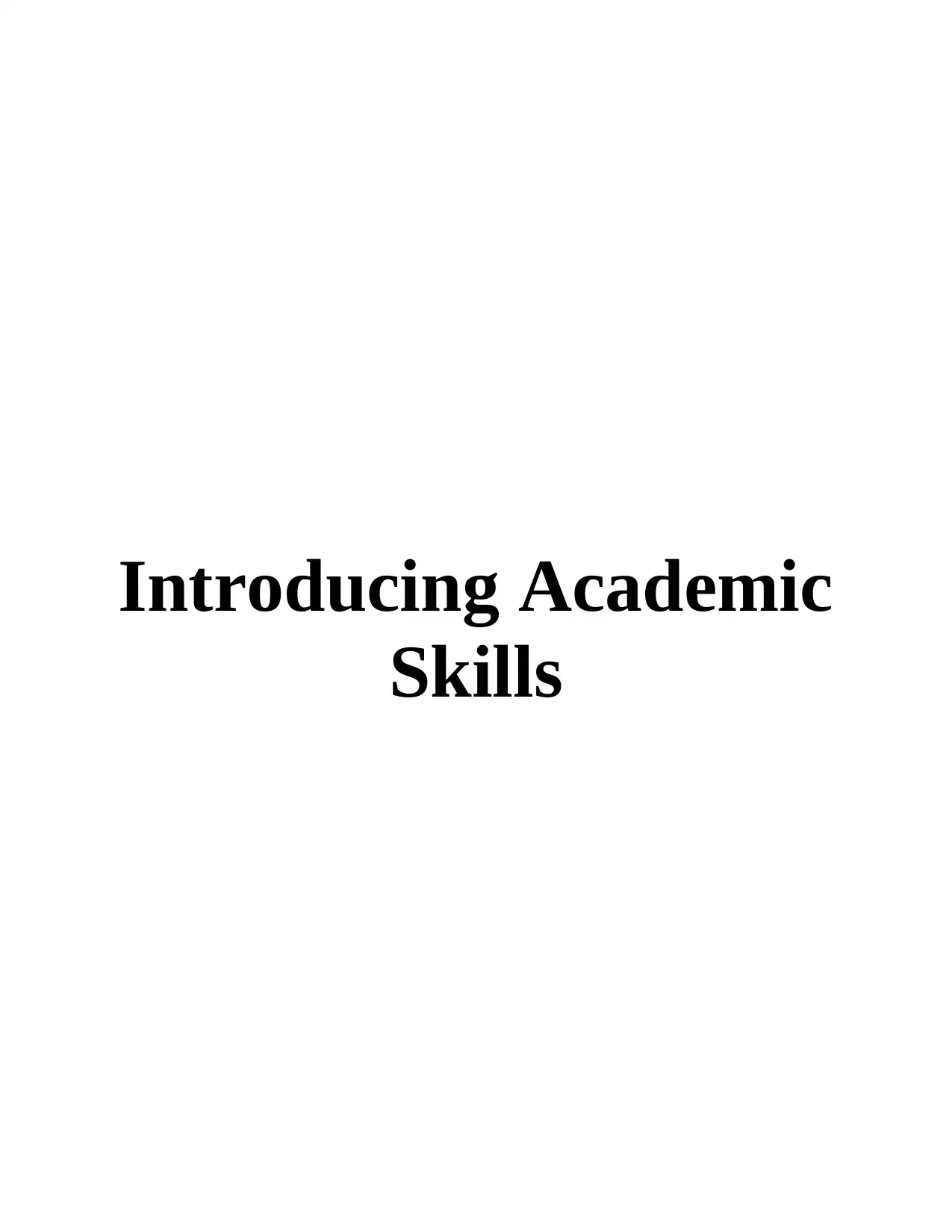
Introducing Academic
Skills
Skills
Paraphrase This Document
Need a fresh take? Get an instant paraphrase of this document with our AI Paraphraser
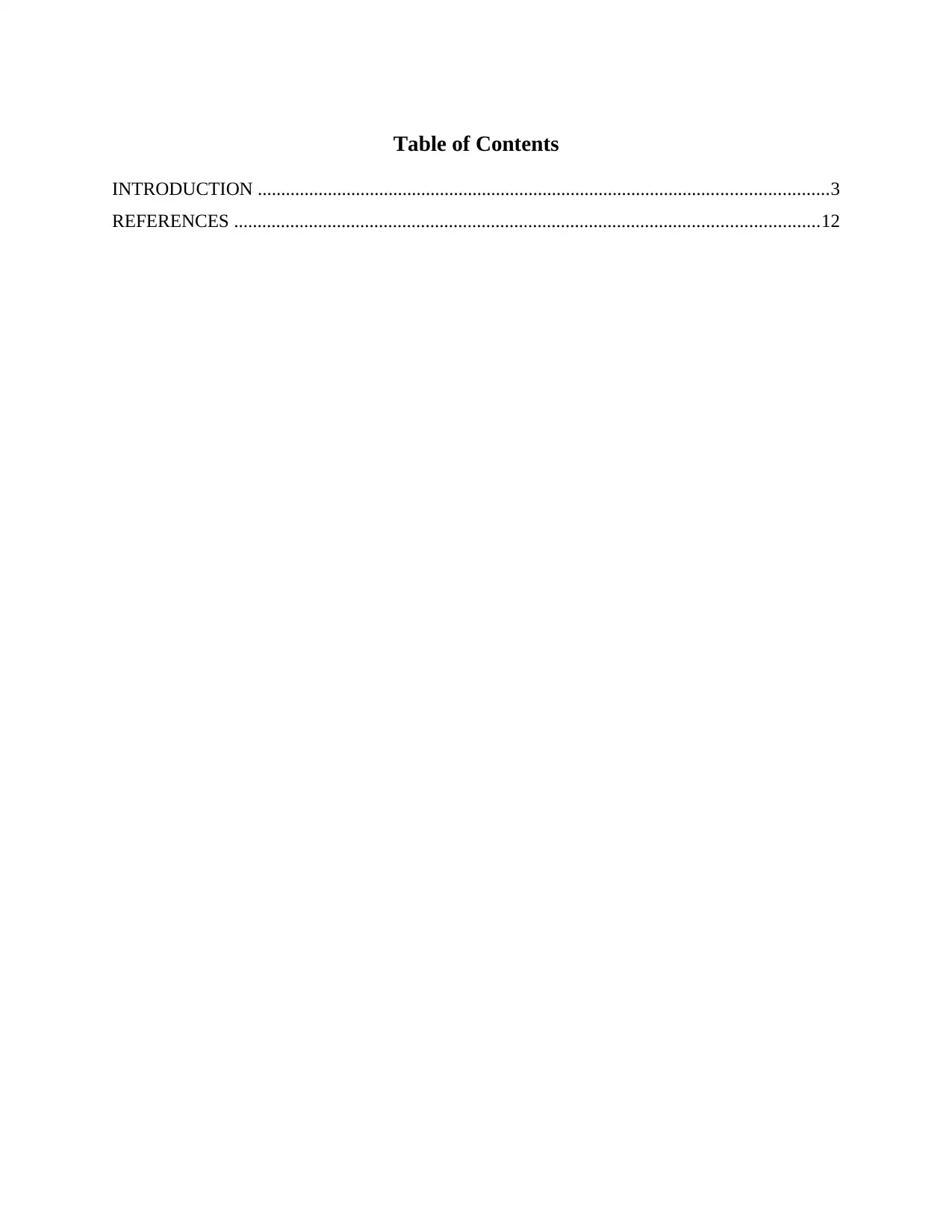
Table of Contents
INTRODUCTION ..........................................................................................................................3
REFERENCES .............................................................................................................................12
INTRODUCTION ..........................................................................................................................3
REFERENCES .............................................................................................................................12
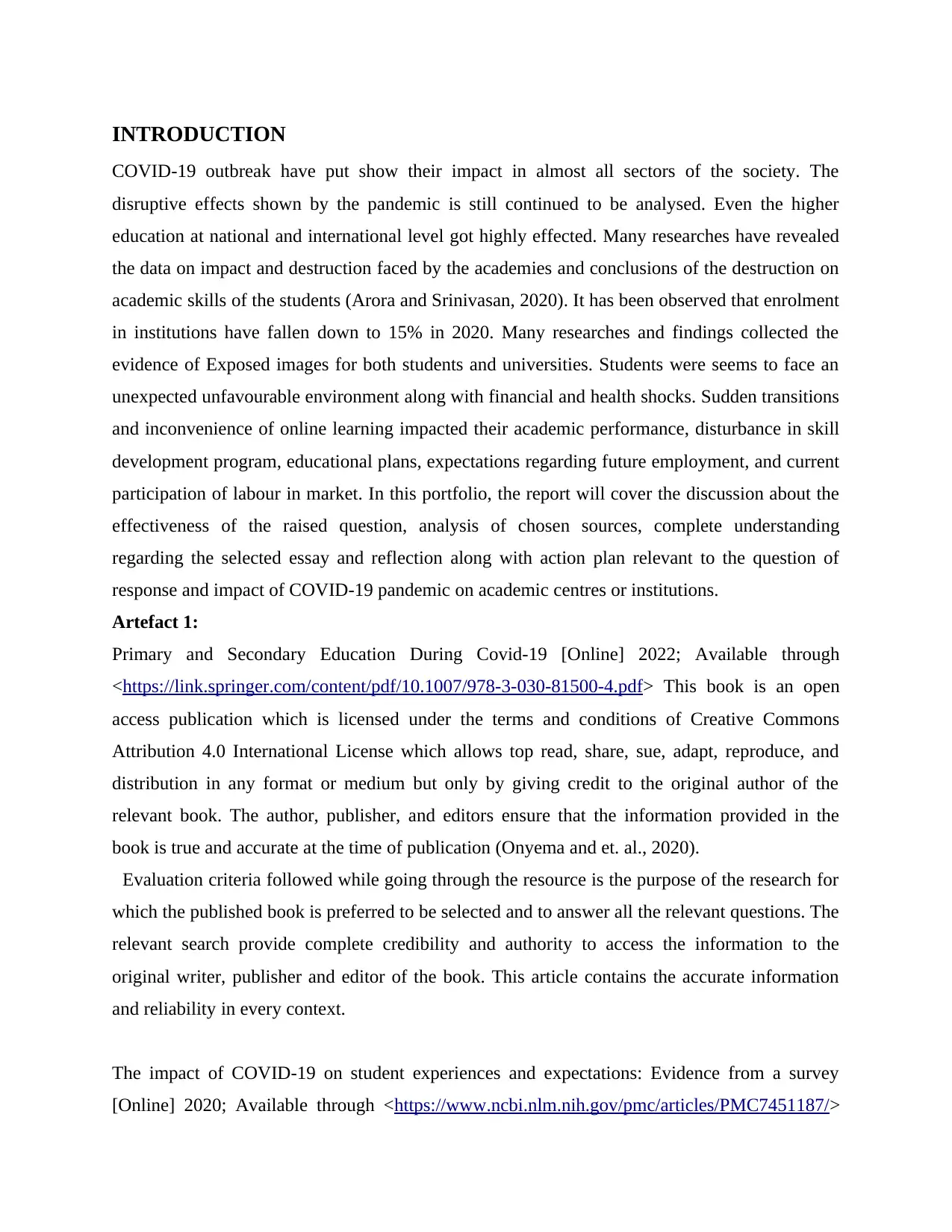
INTRODUCTION
COVID-19 outbreak have put show their impact in almost all sectors of the society. The
disruptive effects shown by the pandemic is still continued to be analysed. Even the higher
education at national and international level got highly effected. Many researches have revealed
the data on impact and destruction faced by the academies and conclusions of the destruction on
academic skills of the students (Arora and Srinivasan, 2020). It has been observed that enrolment
in institutions have fallen down to 15% in 2020. Many researches and findings collected the
evidence of Exposed images for both students and universities. Students were seems to face an
unexpected unfavourable environment along with financial and health shocks. Sudden transitions
and inconvenience of online learning impacted their academic performance, disturbance in skill
development program, educational plans, expectations regarding future employment, and current
participation of labour in market. In this portfolio, the report will cover the discussion about the
effectiveness of the raised question, analysis of chosen sources, complete understanding
regarding the selected essay and reflection along with action plan relevant to the question of
response and impact of COVID-19 pandemic on academic centres or institutions.
Artefact 1:
Primary and Secondary Education During Covid-19 [Online] 2022; Available through
<https://link.springer.com/content/pdf/10.1007/978-3-030-81500-4.pdf> This book is an open
access publication which is licensed under the terms and conditions of Creative Commons
Attribution 4.0 International License which allows top read, share, sue, adapt, reproduce, and
distribution in any format or medium but only by giving credit to the original author of the
relevant book. The author, publisher, and editors ensure that the information provided in the
book is true and accurate at the time of publication (Onyema and et. al., 2020).
Evaluation criteria followed while going through the resource is the purpose of the research for
which the published book is preferred to be selected and to answer all the relevant questions. The
relevant search provide complete credibility and authority to access the information to the
original writer, publisher and editor of the book. This article contains the accurate information
and reliability in every context.
The impact of COVID-19 on student experiences and expectations: Evidence from a survey
[Online] 2020; Available through <https://www.ncbi.nlm.nih.gov/pmc/articles/PMC7451187/>
COVID-19 outbreak have put show their impact in almost all sectors of the society. The
disruptive effects shown by the pandemic is still continued to be analysed. Even the higher
education at national and international level got highly effected. Many researches have revealed
the data on impact and destruction faced by the academies and conclusions of the destruction on
academic skills of the students (Arora and Srinivasan, 2020). It has been observed that enrolment
in institutions have fallen down to 15% in 2020. Many researches and findings collected the
evidence of Exposed images for both students and universities. Students were seems to face an
unexpected unfavourable environment along with financial and health shocks. Sudden transitions
and inconvenience of online learning impacted their academic performance, disturbance in skill
development program, educational plans, expectations regarding future employment, and current
participation of labour in market. In this portfolio, the report will cover the discussion about the
effectiveness of the raised question, analysis of chosen sources, complete understanding
regarding the selected essay and reflection along with action plan relevant to the question of
response and impact of COVID-19 pandemic on academic centres or institutions.
Artefact 1:
Primary and Secondary Education During Covid-19 [Online] 2022; Available through
<https://link.springer.com/content/pdf/10.1007/978-3-030-81500-4.pdf> This book is an open
access publication which is licensed under the terms and conditions of Creative Commons
Attribution 4.0 International License which allows top read, share, sue, adapt, reproduce, and
distribution in any format or medium but only by giving credit to the original author of the
relevant book. The author, publisher, and editors ensure that the information provided in the
book is true and accurate at the time of publication (Onyema and et. al., 2020).
Evaluation criteria followed while going through the resource is the purpose of the research for
which the published book is preferred to be selected and to answer all the relevant questions. The
relevant search provide complete credibility and authority to access the information to the
original writer, publisher and editor of the book. This article contains the accurate information
and reliability in every context.
The impact of COVID-19 on student experiences and expectations: Evidence from a survey
[Online] 2020; Available through <https://www.ncbi.nlm.nih.gov/pmc/articles/PMC7451187/>
⊘ This is a preview!⊘
Do you want full access?
Subscribe today to unlock all pages.

Trusted by 1+ million students worldwide
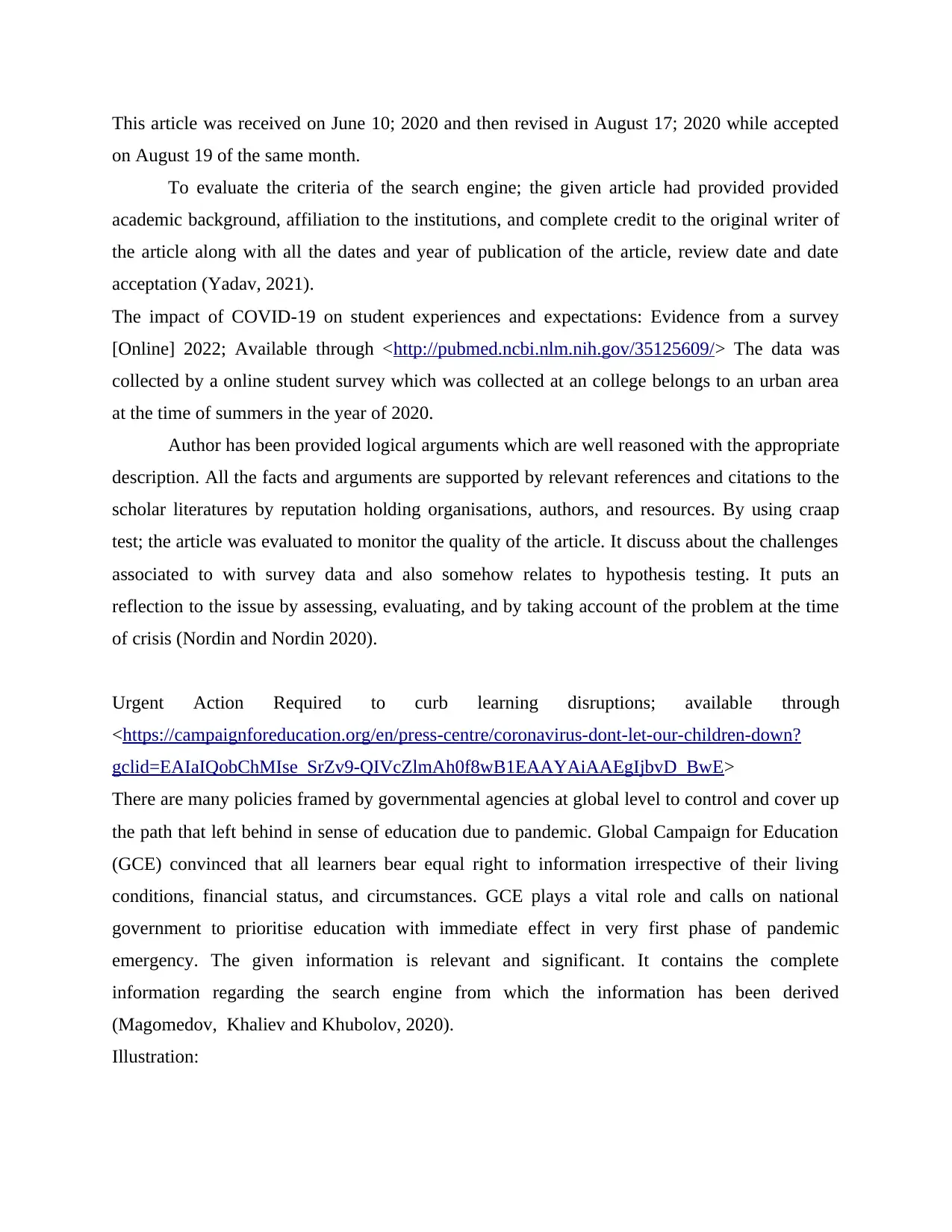
This article was received on June 10; 2020 and then revised in August 17; 2020 while accepted
on August 19 of the same month.
To evaluate the criteria of the search engine; the given article had provided provided
academic background, affiliation to the institutions, and complete credit to the original writer of
the article along with all the dates and year of publication of the article, review date and date
acceptation (Yadav, 2021).
The impact of COVID-19 on student experiences and expectations: Evidence from a survey
[Online] 2022; Available through <http://pubmed.ncbi.nlm.nih.gov/35125609/> The data was
collected by a online student survey which was collected at an college belongs to an urban area
at the time of summers in the year of 2020.
Author has been provided logical arguments which are well reasoned with the appropriate
description. All the facts and arguments are supported by relevant references and citations to the
scholar literatures by reputation holding organisations, authors, and resources. By using craap
test; the article was evaluated to monitor the quality of the article. It discuss about the challenges
associated to with survey data and also somehow relates to hypothesis testing. It puts an
reflection to the issue by assessing, evaluating, and by taking account of the problem at the time
of crisis (Nordin and Nordin 2020).
Urgent Action Required to curb learning disruptions; available through
<https://campaignforeducation.org/en/press-centre/coronavirus-dont-let-our-children-down?
gclid=EAIaIQobChMIse_SrZv9-QIVcZlmAh0f8wB1EAAYAiAAEgIjbvD_BwE>
There are many policies framed by governmental agencies at global level to control and cover up
the path that left behind in sense of education due to pandemic. Global Campaign for Education
(GCE) convinced that all learners bear equal right to information irrespective of their living
conditions, financial status, and circumstances. GCE plays a vital role and calls on national
government to prioritise education with immediate effect in very first phase of pandemic
emergency. The given information is relevant and significant. It contains the complete
information regarding the search engine from which the information has been derived
(Magomedov, Khaliev and Khubolov, 2020).
Illustration:
on August 19 of the same month.
To evaluate the criteria of the search engine; the given article had provided provided
academic background, affiliation to the institutions, and complete credit to the original writer of
the article along with all the dates and year of publication of the article, review date and date
acceptation (Yadav, 2021).
The impact of COVID-19 on student experiences and expectations: Evidence from a survey
[Online] 2022; Available through <http://pubmed.ncbi.nlm.nih.gov/35125609/> The data was
collected by a online student survey which was collected at an college belongs to an urban area
at the time of summers in the year of 2020.
Author has been provided logical arguments which are well reasoned with the appropriate
description. All the facts and arguments are supported by relevant references and citations to the
scholar literatures by reputation holding organisations, authors, and resources. By using craap
test; the article was evaluated to monitor the quality of the article. It discuss about the challenges
associated to with survey data and also somehow relates to hypothesis testing. It puts an
reflection to the issue by assessing, evaluating, and by taking account of the problem at the time
of crisis (Nordin and Nordin 2020).
Urgent Action Required to curb learning disruptions; available through
<https://campaignforeducation.org/en/press-centre/coronavirus-dont-let-our-children-down?
gclid=EAIaIQobChMIse_SrZv9-QIVcZlmAh0f8wB1EAAYAiAAEgIjbvD_BwE>
There are many policies framed by governmental agencies at global level to control and cover up
the path that left behind in sense of education due to pandemic. Global Campaign for Education
(GCE) convinced that all learners bear equal right to information irrespective of their living
conditions, financial status, and circumstances. GCE plays a vital role and calls on national
government to prioritise education with immediate effect in very first phase of pandemic
emergency. The given information is relevant and significant. It contains the complete
information regarding the search engine from which the information has been derived
(Magomedov, Khaliev and Khubolov, 2020).
Illustration:
Paraphrase This Document
Need a fresh take? Get an instant paraphrase of this document with our AI Paraphraser
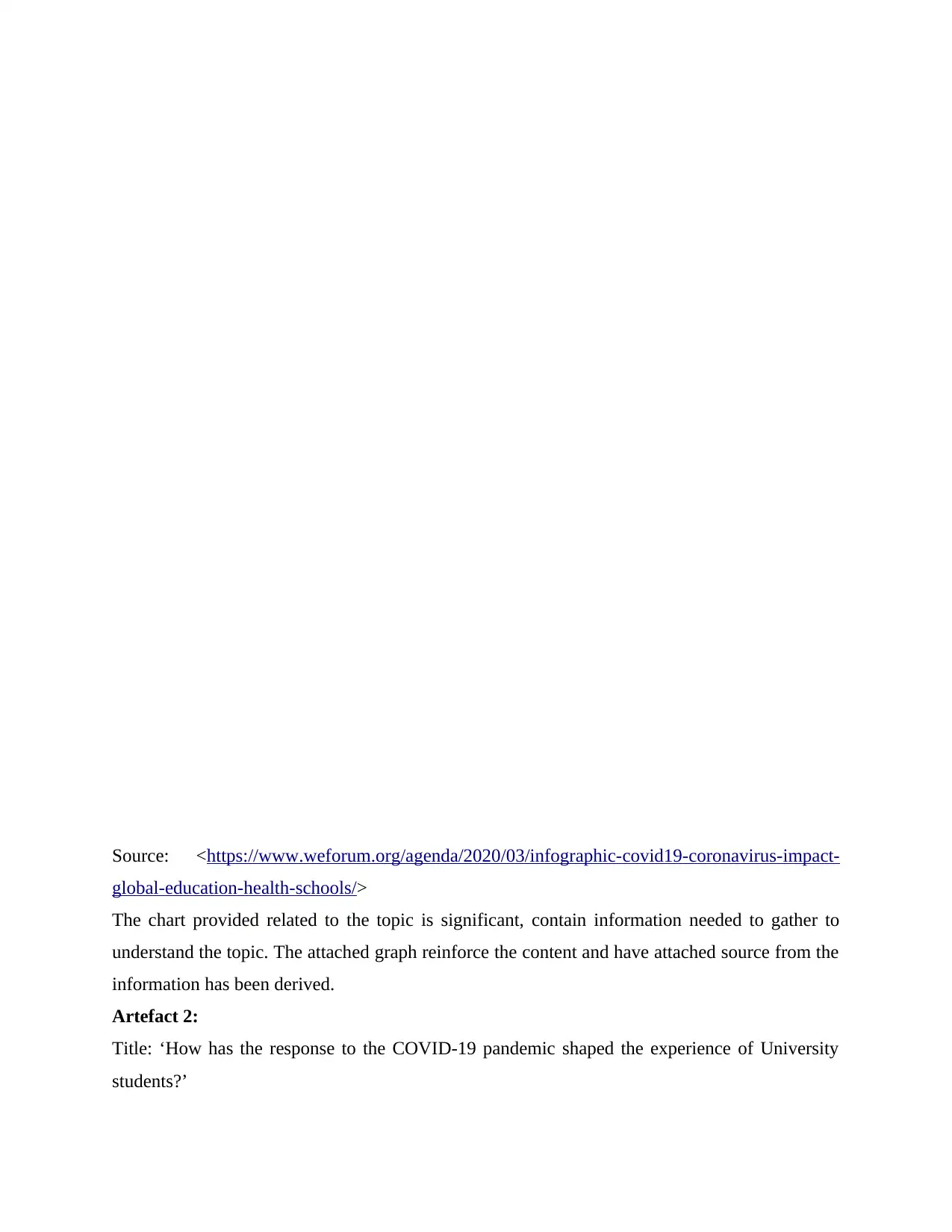
Source: <https://www.weforum.org/agenda/2020/03/infographic-covid19-coronavirus-impact-
global-education-health-schools/>
The chart provided related to the topic is significant, contain information needed to gather to
understand the topic. The attached graph reinforce the content and have attached source from the
information has been derived.
Artefact 2:
Title: ‘How has the response to the COVID-19 pandemic shaped the experience of University
students?’
global-education-health-schools/>
The chart provided related to the topic is significant, contain information needed to gather to
understand the topic. The attached graph reinforce the content and have attached source from the
information has been derived.
Artefact 2:
Title: ‘How has the response to the COVID-19 pandemic shaped the experience of University
students?’
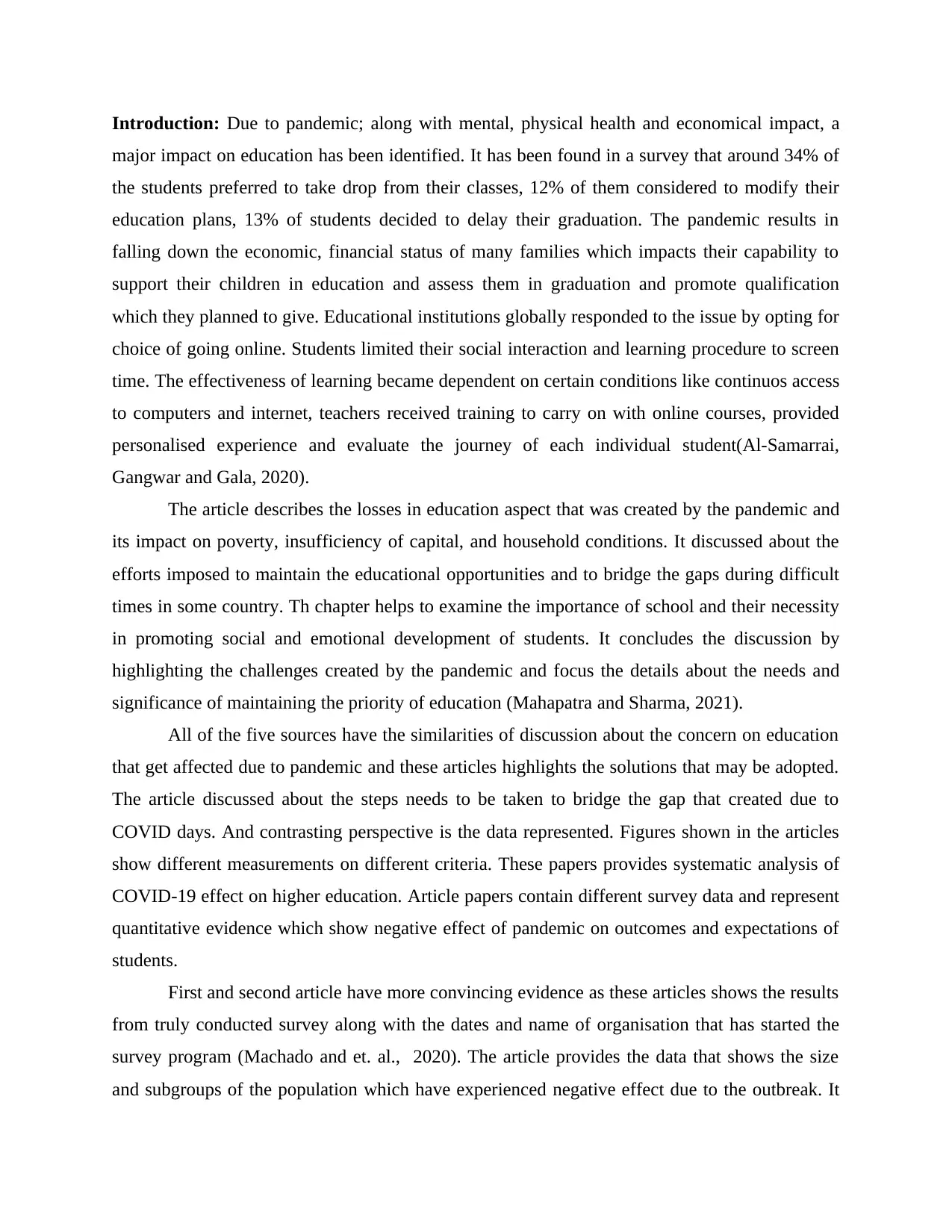
Introduction: Due to pandemic; along with mental, physical health and economical impact, a
major impact on education has been identified. It has been found in a survey that around 34% of
the students preferred to take drop from their classes, 12% of them considered to modify their
education plans, 13% of students decided to delay their graduation. The pandemic results in
falling down the economic, financial status of many families which impacts their capability to
support their children in education and assess them in graduation and promote qualification
which they planned to give. Educational institutions globally responded to the issue by opting for
choice of going online. Students limited their social interaction and learning procedure to screen
time. The effectiveness of learning became dependent on certain conditions like continuos access
to computers and internet, teachers received training to carry on with online courses, provided
personalised experience and evaluate the journey of each individual student(Al-Samarrai,
Gangwar and Gala, 2020).
The article describes the losses in education aspect that was created by the pandemic and
its impact on poverty, insufficiency of capital, and household conditions. It discussed about the
efforts imposed to maintain the educational opportunities and to bridge the gaps during difficult
times in some country. Th chapter helps to examine the importance of school and their necessity
in promoting social and emotional development of students. It concludes the discussion by
highlighting the challenges created by the pandemic and focus the details about the needs and
significance of maintaining the priority of education (Mahapatra and Sharma, 2021).
All of the five sources have the similarities of discussion about the concern on education
that get affected due to pandemic and these articles highlights the solutions that may be adopted.
The article discussed about the steps needs to be taken to bridge the gap that created due to
COVID days. And contrasting perspective is the data represented. Figures shown in the articles
show different measurements on different criteria. These papers provides systematic analysis of
COVID-19 effect on higher education. Article papers contain different survey data and represent
quantitative evidence which show negative effect of pandemic on outcomes and expectations of
students.
First and second article have more convincing evidence as these articles shows the results
from truly conducted survey along with the dates and name of organisation that has started the
survey program (Machado and et. al., 2020). The article provides the data that shows the size
and subgroups of the population which have experienced negative effect due to the outbreak. It
major impact on education has been identified. It has been found in a survey that around 34% of
the students preferred to take drop from their classes, 12% of them considered to modify their
education plans, 13% of students decided to delay their graduation. The pandemic results in
falling down the economic, financial status of many families which impacts their capability to
support their children in education and assess them in graduation and promote qualification
which they planned to give. Educational institutions globally responded to the issue by opting for
choice of going online. Students limited their social interaction and learning procedure to screen
time. The effectiveness of learning became dependent on certain conditions like continuos access
to computers and internet, teachers received training to carry on with online courses, provided
personalised experience and evaluate the journey of each individual student(Al-Samarrai,
Gangwar and Gala, 2020).
The article describes the losses in education aspect that was created by the pandemic and
its impact on poverty, insufficiency of capital, and household conditions. It discussed about the
efforts imposed to maintain the educational opportunities and to bridge the gaps during difficult
times in some country. Th chapter helps to examine the importance of school and their necessity
in promoting social and emotional development of students. It concludes the discussion by
highlighting the challenges created by the pandemic and focus the details about the needs and
significance of maintaining the priority of education (Mahapatra and Sharma, 2021).
All of the five sources have the similarities of discussion about the concern on education
that get affected due to pandemic and these articles highlights the solutions that may be adopted.
The article discussed about the steps needs to be taken to bridge the gap that created due to
COVID days. And contrasting perspective is the data represented. Figures shown in the articles
show different measurements on different criteria. These papers provides systematic analysis of
COVID-19 effect on higher education. Article papers contain different survey data and represent
quantitative evidence which show negative effect of pandemic on outcomes and expectations of
students.
First and second article have more convincing evidence as these articles shows the results
from truly conducted survey along with the dates and name of organisation that has started the
survey program (Machado and et. al., 2020). The article provides the data that shows the size
and subgroups of the population which have experienced negative effect due to the outbreak. It
⊘ This is a preview!⊘
Do you want full access?
Subscribe today to unlock all pages.

Trusted by 1+ million students worldwide
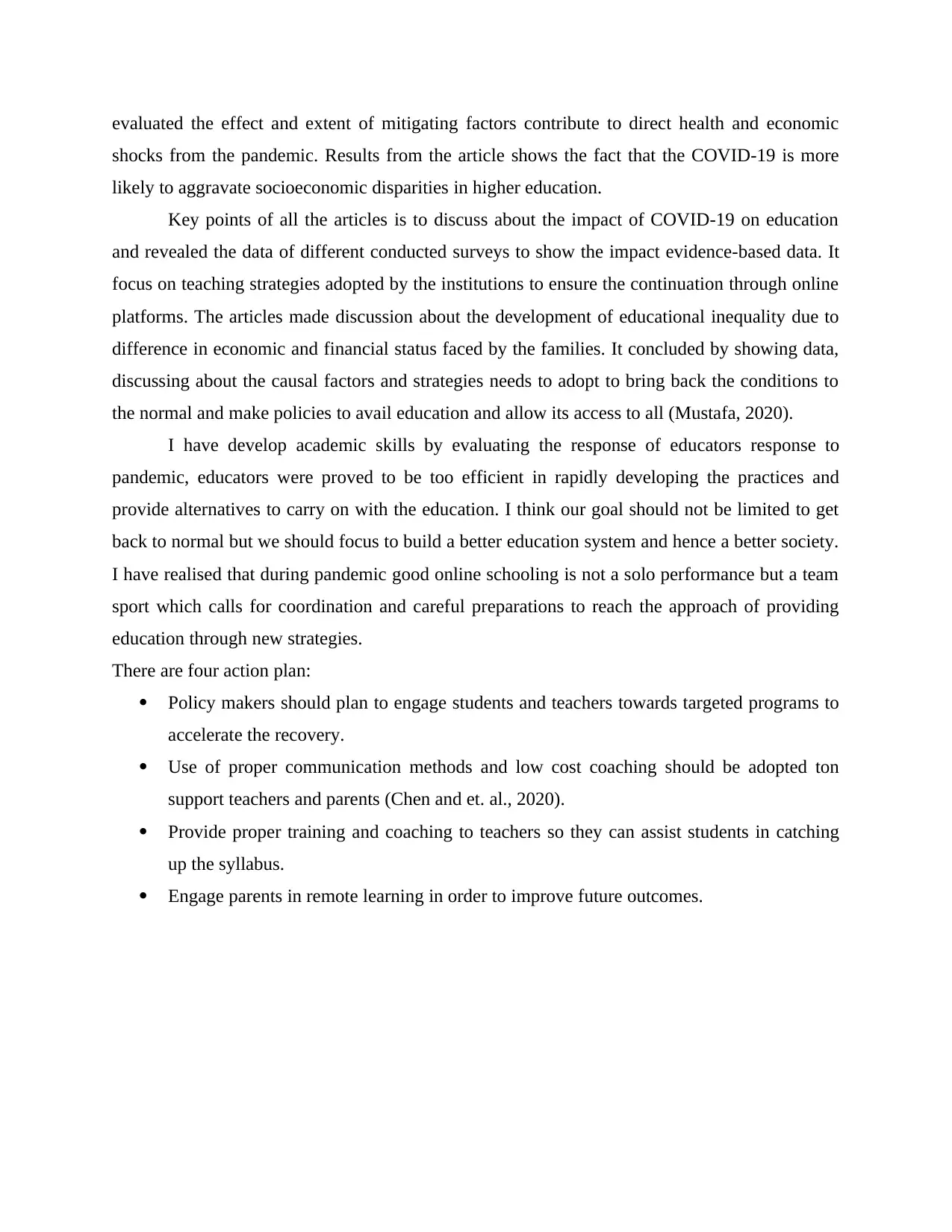
evaluated the effect and extent of mitigating factors contribute to direct health and economic
shocks from the pandemic. Results from the article shows the fact that the COVID-19 is more
likely to aggravate socioeconomic disparities in higher education.
Key points of all the articles is to discuss about the impact of COVID-19 on education
and revealed the data of different conducted surveys to show the impact evidence-based data. It
focus on teaching strategies adopted by the institutions to ensure the continuation through online
platforms. The articles made discussion about the development of educational inequality due to
difference in economic and financial status faced by the families. It concluded by showing data,
discussing about the causal factors and strategies needs to adopt to bring back the conditions to
the normal and make policies to avail education and allow its access to all (Mustafa, 2020).
I have develop academic skills by evaluating the response of educators response to
pandemic, educators were proved to be too efficient in rapidly developing the practices and
provide alternatives to carry on with the education. I think our goal should not be limited to get
back to normal but we should focus to build a better education system and hence a better society.
I have realised that during pandemic good online schooling is not a solo performance but a team
sport which calls for coordination and careful preparations to reach the approach of providing
education through new strategies.
There are four action plan:
Policy makers should plan to engage students and teachers towards targeted programs to
accelerate the recovery.
Use of proper communication methods and low cost coaching should be adopted ton
support teachers and parents (Chen and et. al., 2020).
Provide proper training and coaching to teachers so they can assist students in catching
up the syllabus.
Engage parents in remote learning in order to improve future outcomes.
shocks from the pandemic. Results from the article shows the fact that the COVID-19 is more
likely to aggravate socioeconomic disparities in higher education.
Key points of all the articles is to discuss about the impact of COVID-19 on education
and revealed the data of different conducted surveys to show the impact evidence-based data. It
focus on teaching strategies adopted by the institutions to ensure the continuation through online
platforms. The articles made discussion about the development of educational inequality due to
difference in economic and financial status faced by the families. It concluded by showing data,
discussing about the causal factors and strategies needs to adopt to bring back the conditions to
the normal and make policies to avail education and allow its access to all (Mustafa, 2020).
I have develop academic skills by evaluating the response of educators response to
pandemic, educators were proved to be too efficient in rapidly developing the practices and
provide alternatives to carry on with the education. I think our goal should not be limited to get
back to normal but we should focus to build a better education system and hence a better society.
I have realised that during pandemic good online schooling is not a solo performance but a team
sport which calls for coordination and careful preparations to reach the approach of providing
education through new strategies.
There are four action plan:
Policy makers should plan to engage students and teachers towards targeted programs to
accelerate the recovery.
Use of proper communication methods and low cost coaching should be adopted ton
support teachers and parents (Chen and et. al., 2020).
Provide proper training and coaching to teachers so they can assist students in catching
up the syllabus.
Engage parents in remote learning in order to improve future outcomes.
Paraphrase This Document
Need a fresh take? Get an instant paraphrase of this document with our AI Paraphraser
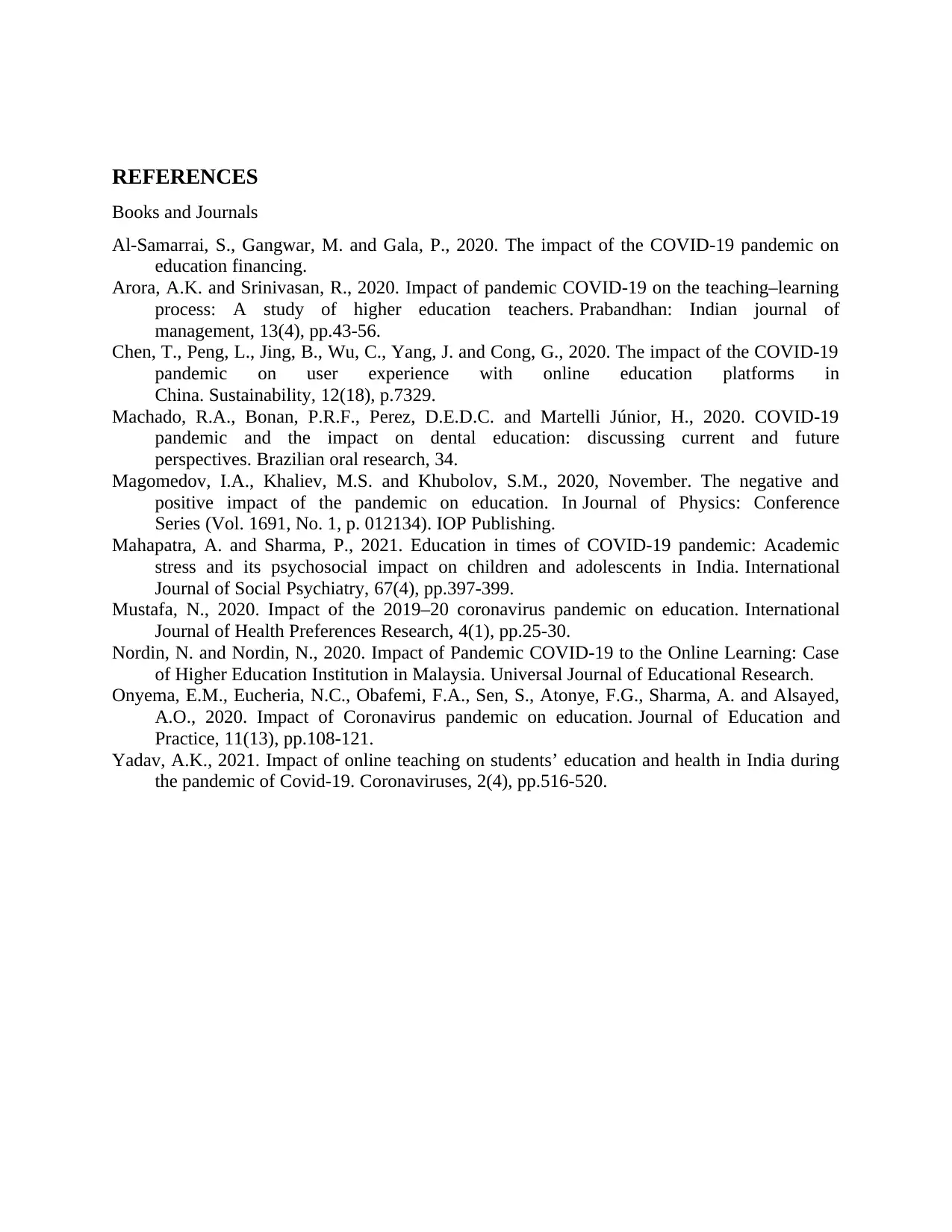
REFERENCES
Books and Journals
Al-Samarrai, S., Gangwar, M. and Gala, P., 2020. The impact of the COVID-19 pandemic on
education financing.
Arora, A.K. and Srinivasan, R., 2020. Impact of pandemic COVID-19 on the teaching–learning
process: A study of higher education teachers. Prabandhan: Indian journal of
management, 13(4), pp.43-56.
Chen, T., Peng, L., Jing, B., Wu, C., Yang, J. and Cong, G., 2020. The impact of the COVID-19
pandemic on user experience with online education platforms in
China. Sustainability, 12(18), p.7329.
Machado, R.A., Bonan, P.R.F., Perez, D.E.D.C. and Martelli Júnior, H., 2020. COVID-19
pandemic and the impact on dental education: discussing current and future
perspectives. Brazilian oral research, 34.
Magomedov, I.A., Khaliev, M.S. and Khubolov, S.M., 2020, November. The negative and
positive impact of the pandemic on education. In Journal of Physics: Conference
Series (Vol. 1691, No. 1, p. 012134). IOP Publishing.
Mahapatra, A. and Sharma, P., 2021. Education in times of COVID-19 pandemic: Academic
stress and its psychosocial impact on children and adolescents in India. International
Journal of Social Psychiatry, 67(4), pp.397-399.
Mustafa, N., 2020. Impact of the 2019–20 coronavirus pandemic on education. International
Journal of Health Preferences Research, 4(1), pp.25-30.
Nordin, N. and Nordin, N., 2020. Impact of Pandemic COVID-19 to the Online Learning: Case
of Higher Education Institution in Malaysia. Universal Journal of Educational Research.
Onyema, E.M., Eucheria, N.C., Obafemi, F.A., Sen, S., Atonye, F.G., Sharma, A. and Alsayed,
A.O., 2020. Impact of Coronavirus pandemic on education. Journal of Education and
Practice, 11(13), pp.108-121.
Yadav, A.K., 2021. Impact of online teaching on students’ education and health in India during
the pandemic of Covid-19. Coronaviruses, 2(4), pp.516-520.
Books and Journals
Al-Samarrai, S., Gangwar, M. and Gala, P., 2020. The impact of the COVID-19 pandemic on
education financing.
Arora, A.K. and Srinivasan, R., 2020. Impact of pandemic COVID-19 on the teaching–learning
process: A study of higher education teachers. Prabandhan: Indian journal of
management, 13(4), pp.43-56.
Chen, T., Peng, L., Jing, B., Wu, C., Yang, J. and Cong, G., 2020. The impact of the COVID-19
pandemic on user experience with online education platforms in
China. Sustainability, 12(18), p.7329.
Machado, R.A., Bonan, P.R.F., Perez, D.E.D.C. and Martelli Júnior, H., 2020. COVID-19
pandemic and the impact on dental education: discussing current and future
perspectives. Brazilian oral research, 34.
Magomedov, I.A., Khaliev, M.S. and Khubolov, S.M., 2020, November. The negative and
positive impact of the pandemic on education. In Journal of Physics: Conference
Series (Vol. 1691, No. 1, p. 012134). IOP Publishing.
Mahapatra, A. and Sharma, P., 2021. Education in times of COVID-19 pandemic: Academic
stress and its psychosocial impact on children and adolescents in India. International
Journal of Social Psychiatry, 67(4), pp.397-399.
Mustafa, N., 2020. Impact of the 2019–20 coronavirus pandemic on education. International
Journal of Health Preferences Research, 4(1), pp.25-30.
Nordin, N. and Nordin, N., 2020. Impact of Pandemic COVID-19 to the Online Learning: Case
of Higher Education Institution in Malaysia. Universal Journal of Educational Research.
Onyema, E.M., Eucheria, N.C., Obafemi, F.A., Sen, S., Atonye, F.G., Sharma, A. and Alsayed,
A.O., 2020. Impact of Coronavirus pandemic on education. Journal of Education and
Practice, 11(13), pp.108-121.
Yadav, A.K., 2021. Impact of online teaching on students’ education and health in India during
the pandemic of Covid-19. Coronaviruses, 2(4), pp.516-520.

⊘ This is a preview!⊘
Do you want full access?
Subscribe today to unlock all pages.

Trusted by 1+ million students worldwide
1 out of 9
Your All-in-One AI-Powered Toolkit for Academic Success.
+13062052269
info@desklib.com
Available 24*7 on WhatsApp / Email
![[object Object]](/_next/static/media/star-bottom.7253800d.svg)
Unlock your academic potential
Copyright © 2020–2025 A2Z Services. All Rights Reserved. Developed and managed by ZUCOL.


